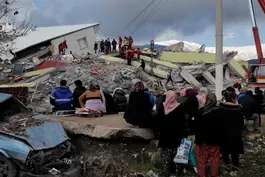
FBI foils plot to bring down Baltimore’s electrical grid
Clip: 2/7/2023 | 6m 34sVideo has Closed Captions
FBI foils extremist plot to bring down Baltimore’s electrical grid
Attacks on electrical systems were up by nearly 80% in 2022 compared to the previous year. Monday, the FBI said it foiled an alleged neo-Nazi plot to attack multiple substations and transformers around Baltimore. It follows recent physical attacks on electrical stations in North Carolina, Oregon and Washington. William Brangham spoke with Brian Levin about the increasing attacks by extremists.
Problems with Closed Captions? Closed Captioning Feedback
Problems with Closed Captions? Closed Captioning Feedback
Major corporate funding for the PBS News Hour is provided by BDO, BNSF, Consumer Cellular, American Cruise Lines, and Raymond James. Funding for the PBS NewsHour Weekend is provided by...

FBI foils plot to bring down Baltimore’s electrical grid
Clip: 2/7/2023 | 6m 34sVideo has Closed Captions
Attacks on electrical systems were up by nearly 80% in 2022 compared to the previous year. Monday, the FBI said it foiled an alleged neo-Nazi plot to attack multiple substations and transformers around Baltimore. It follows recent physical attacks on electrical stations in North Carolina, Oregon and Washington. William Brangham spoke with Brian Levin about the increasing attacks by extremists.
Problems with Closed Captions? Closed Captioning Feedback
How to Watch PBS News Hour
PBS News Hour is available to stream on pbs.org and the free PBS App, available on iPhone, Apple TV, Android TV, Android smartphones, Amazon Fire TV, Amazon Fire Tablet, Roku, Samsung Smart TV, and Vizio.
Providing Support for PBS.org
Learn Moreabout PBS online sponsorshipAMNA NAWAZ: Now let's focus on increasing attacks by extremists and others to disrupt and knock out the power grid.
Direct attacks on electrical substations, including vandalism and other suspicious activity, were up by nearly 80 percent in 2022 compared to the previous year.
Yesterday, authorities said they had foiled an alleged neo-Nazi plot to attack multiple substations and transformers around Baltimore.
William Brangham has the details.
WILLIAM BRANGHAM: Amna, the FBI said it had arrested two suspects in this case last week, Sarah Beth Clendaniel of Maryland and Brandon Russell of Florida.
Federal officials say Russell, who was just released after a five-year sentence on bomb charges, is a founder of a neo-Nazi group known as the Atomwaffen.
This alleged plot in Baltimore follows recent physical attacks on electrical stations in North Carolina, Oregon and Washington state, attacks that left tens of thousands of people without power.
Motives in all those cases haven't been determined.
Brian Levin watches all this at the Center for the Study of Hate and Extremism at California state University in San Bernardino.
And he joins us now.
Brian Levin, thank you so much for being here.
Last year, the Department of Homeland Security indicated that racist extremist groups would be targeting infrastructure, very much like this alleged plot in Baltimore.
Can you help us understand, why would neo-Nazis want to attack a power station?
How does that further their goals?
BRIAN LEVIN, Center for the Study of Hate and Extremism: A couple of things.
First of all, historically and culturally, infrastructure plots and attacks and the glorification of it with within various books throughout the movement and prior plots goes back decades.
Some decades ago, I testified before Congress about something called leaderless resistance.
And, as the far right frequently throughout history, and especially today, has become very fragmented and cellular, these kinds of targeted attacks that can be done by lone actors or small cells is very appealing, because it gives them leverage with respect to their small numbers.
So, we have both a historic sociocultural identification of these locations as legitimate targets and an overall racial holy war or civil war or, as accelerationists want to do, just burn down society.
These folks are looking for some kind of chaos.
And what they were hoping is there would be some kind of violent conflict around these attacks or, as in some of these plots most recently, attacks that take place around already emergency situations, like snowstorms or natural disasters.
So what they hope to do as part of the accelerationist wing of neo-Nazism, but that actually goes across the ideological spectrum, is to cause chaos and continuing lack of confidence and -- in institutions and infighting amongst citizens.
And they figure these kinds of targeted attacks, assassinations, and violence at rallies could combine to create that critical mass of revolution for white supremacy.
WILLIAM BRANGHAM: I see.
This Baltimore plot, along with these others that we have seen in Washington state and North Carolina and Oregon, seem to indicate, though, that these power substations are themselves particularly vulnerable.
Is that your understanding as well?
BRIAN LEVIN: Well, I would prefer not to go into particular vulnerabilities of specific locations.
But let me just say this is, we know that the protection of various substations and related facilities is very uneven across the country.
And we really have to raise the national standards, not only with respect to physical attacks, but also cyberattacks, which may not only just come from white supremacists and accelerationists, but others who either are connected to a foreign entity or are transnational in their white supremacy, not necessarily exclusively domestic.
And, indeed, Atomwaffen and some of these other groups have international footprints.
So, we have to look at not only the physical infrastructure, but also cyber, as an increasingly available set of malefactors is available to want to hit our critical infrastructure.
WILLIAM BRANGHAM: So, given those vulnerabilities that you're describing, I mean, what would you be recommending that governments and utilities be doing to help harden these pieces of infrastructure?
BRIAN LEVIN: I think they have to look from within.
I think they have to go to the experts that are working there and say, what are our vulnerabilities?
Even do some drills where folks might try to -- with proper vetting, try to show where these vulnerabilities are.
So, that's one thing.
The other thing is, increasingly, surveillance systems are becoming much more inexpensive.
So we have to look at that as well.
And, again, don't forget the cyber infrastructure.
We know from the past that, for instance, there have been attempts to breach, for instance, critical infrastructure here in the United States, from water systems, to hospitals, and other places where we rely on them for our safety, but also our routine daily activities.
So, anything, frankly, that would be a vulnerability for some kind of mass chaos, I think communities have to look at.
And, of course, communication systems, electrical infrastructure, health care systems, and others are places I certainly would start, as well as cyber infrastructure, really important.
WILLIAM BRANGHAM: All right, Brian Levin at the Center for the Study of Hate and Extremism, thank you so much.
BRIAN LEVIN: Thank you.
Biden to outline accomplishments and tout optimism for U.S.
Video has Closed Captions
Clip: 2/7/2023 | 6m 4s | Biden to outline accomplishments and tout optimism for U.S., White House spokesperson says (6m 4s)
A Brief But Spectacular take on the power of poetry
Video has Closed Captions
Clip: 2/7/2023 | 2m 30s | A Brief But Spectacular take on the power of poetry (2m 30s)
Earthquake death toll rises by thousands in Turkey, Syria
Video has Closed Captions
Clip: 2/7/2023 | 12m 25s | Desperate rescues continue in Turkey and Syria as earthquake death toll rises by thousands (12m 25s)
New England and Frederick Douglass' first steps to freedom
Video has Closed Captions
Clip: 2/7/2023 | 6m 51s | New England's role in Frederick Douglass' first steps to freedom (6m 51s)
S.D. Sen. Thune on what he wants from State of the Union
Video has Closed Captions
Clip: 2/7/2023 | 8m 1s | South Dakota Sen. John Thune on what he wants to hear from State of the Union (8m 1s)
What to expect from Biden's State of the Union address
Video has Closed Captions
Clip: 2/7/2023 | 5m 24s | What to expect from Biden's State of the Union address (5m 24s)
Providing Support for PBS.org
Learn Moreabout PBS online sponsorshipSupport for PBS provided by:
Major corporate funding for the PBS News Hour is provided by BDO, BNSF, Consumer Cellular, American Cruise Lines, and Raymond James. Funding for the PBS NewsHour Weekend is provided by...
















